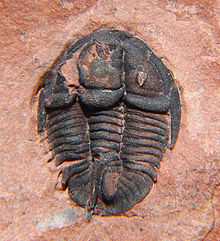Genevievella
| Genevievella Temporal range: Upper Cambrian | |
|---|---|
 | |
| Genevievella granulosa, 18mm | |
| Scientific classification | |
| Kingdom: | Animalia |
| Phylum: | Arthropoda |
| Class: | Trilobita |
| Order: | Asaphida |
| Superfamily: | Anomocaroidea |
| Family: | Llanoaspididae |
| Genus: | Genevievella Lochman, 1936 |
| species | |
| Synonyms | |
|
Stenelymus | |
Genevievella is a genus of trilobite with an short inverted egg-shaped outline, a wide headshield, small eyes, and long genal spines. The backrim of the headshield is inflated and overhangs the first of the 9 thorax segments. The 8th thorax segment from the front bears a backward directed spine that reaches beyond the back end of the exoskeleton. It has an almost oval tailshield with 5 pairs of pleural furrows. It lived during the Upper Cambrian in what are today Canada and the United States.[1]
Distribution
- G. caelata is known from the Upper Cambrian of Australia (Mindyallan, Upper beds Member, Mungerbar Formation, Glenormiston, Queensland, 22.9° S, 138.8° E).[2]
- G. simon, G. cuniculaena, G. raggedi and G. campbellina have been found in the Upper Cambrian of Canada (Dresbachian, Rabbitkettle Formation, Yukon, 62.7° N, 128.4° W).[3]
- G. campbellina occurs in the Upper Cambrian of the United States (Merioneth: Warriorsmark, Huntingdon, Huntingdon; Warrior Formation, near Waddle, Centre County, all Pennsylvania, 40.8° N, 77.9° W)[4]
- G. spinox has been excavated from the Upper Cambrian of the United States (Dresbachian, Coosella zone, Riley Formation, Central Texas, 30.3° N, 97.7° W)[5]
- G. bigranulosa is present in the Upper Cambrian of China (Guzhangian, Glyptagnostus stolidotus trilobite zone and Paibian, Glyptagnostus reticulatus trilobite zone, both Huaqiao Formation, Hunan, 28.4° N, 109.5° E).[6]
References
- ↑ Moore, R.C. (1959). Arthropoda I - Arthropoda General Features, Proarthropoda, Euarthropoda General Features, Trilobitomorpha. Treatise on Invertebrate Paleontology. Part O. Boulder, Colorado/Lawrence, Kansas: Geological Society of America/University of Kansas Press. pp. O301. ISBN 0-8137-3015-5.
- ↑ Pojeta, J.; Gilbert-Tomlinson, J.; Shergold, J.H. (1977). "Cambrian and Ordovician rostroconch molluscs from Northern Australia". Australian Bureau of Mineral Resources, Geology and Geophysics Bulletin 171: 1–54. cited in Pete Wagner. "Locality 50. G127*. Glenormiston". Fossilworks. Retrieved 2012-03-18.
- ↑ Pratt, B.R. (1992). "Trilobites of the Marjuman and Steptoean stages (Upper Cambrian), Rabbitkettle Formation, southern Mackenzie Mountains, northwest Canada". Palaeontographica Canadiana (9): 1–109. cited in Shanan Peters. "Section N - collection N-33". Fossilworks. Retrieved 2012-03-18.
- ↑ Tasch, P. (1951). "Fauna and paleoecology of the Upper Cambrian Warrior Formation of central Pennsylvania". Journal of Paleontology 25 (3): 275–306. cited in Uta Merkel. "Highway No. 322 near Waddle, Bed 11.12". Fossilworks. Retrieved 2012-03-18.
- ↑ Sepkoski Jr., J.J. (1998). "Rates of speciation in the fossil record". Philosophical Transaction of the Royal Society Biological Sciences 353 (1366): 315–326. doi:10.1098/rstb.1998.0212. cited in Mike Sommers. "Central Texas, Riley Fm., Texas". Fossilworks. Retrieved 2012-03-18.
- ↑ Peng, S.; Robison, R.A. (2000). "Agnostid biostratigraphy across the Middle-Upper Cambrian boundary in Hunan, China". Journal of Paleontology Memoir 53. cited in Austin Hendy. "Paibi section, bed 37a". Fossilworks. Retrieved 2012-03-18.